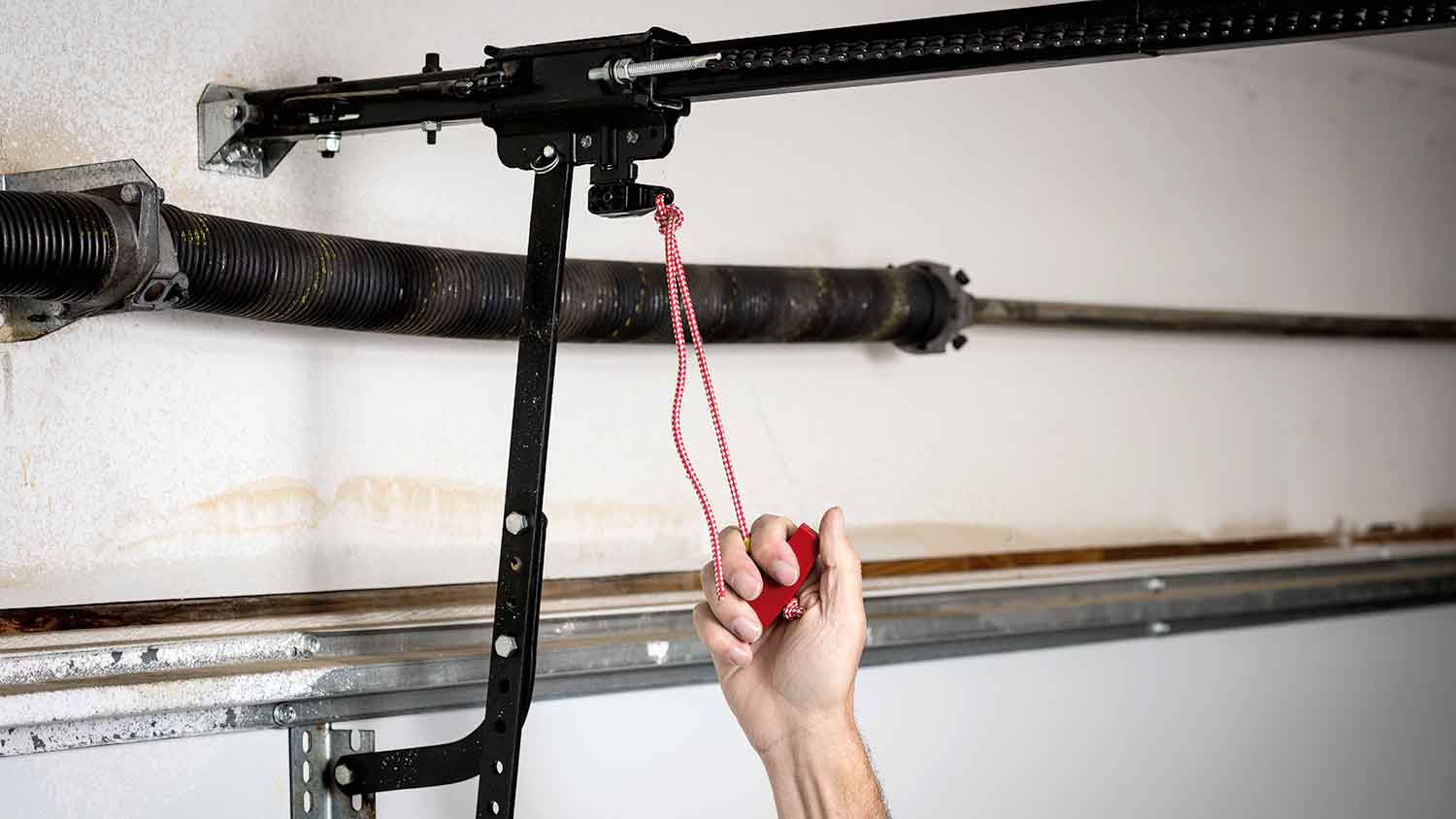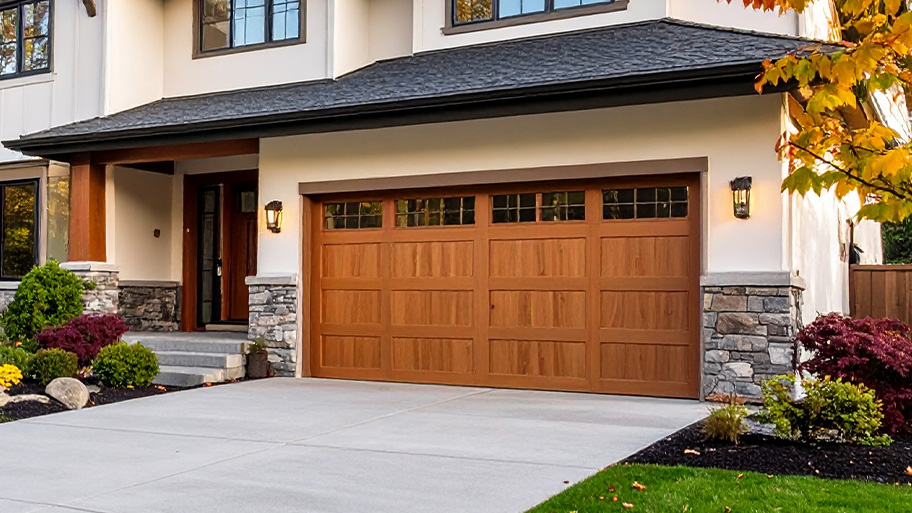
Your garage door belt replacement cost depends on labor and material prices in your location, plus any other repairs needed to minimize belt wear.
What goes up must come down


Never attempt to unload a garage door’s springs yourself, as the immense tension can be dangerous and cause ground and bodily damage.
New garage door sensors cost from $70 to $190.
Replacing a garage door typically costs around $2,000.
A new garage door opener costs $300 to $900 with installation.
Your garage door opened, but now it won’t come down. This situation can certainly be frustrating, especially if a storm is in the forecast. However, don’t call for repair yet as you might be able to manually close the door from the inside, or even troubleshoot whatever is stopping the door from closing. Learn about the common reasons why a garage door won’t close, and then determine if you can DIY a quick fix or if you should call for professional help.
Problems with the sensors are one of the most common reasons why your garage door won’t close. These devices tell the opener if something is under the door and work as safety measurements to prevent the doors from hurting someone or damaging objects while they’re being moved through the entrance.
If the sensors are misaligned, they will continue to tell the door that something is blocking the entryway, preventing it from closing back down. Sensors are usually located inside the door or a few inches above the door next to the tracks. Both sensors should have their lights on. If not, slightly adjust the one without a light until they realign. You should also clean the sensors regularly so the detection lenses stay clear.
If your sensors are broken, simply get some new ones. The cost to replace garage door sensors ranges from $70 to $190 on average.

Grime, dust, and debris will collect on your garage door’s rollers over time. If your garage doors haven’t been opening and closing as smoothly, you might want to check the rollers before your door is stuck at the top.
Do not try to wash the rollers. Grab a metal brush or a dry rag to gently clean the surface. One clean, use white lithium to grease the rollers. Do not use WD-40 or oil-based lubricant, as both types will attract grease and dust and cause more problems.
Bent or damaged tracks can be another reason why your garage doors won’t close. Again, track issues have warning signs. If you hear a loud clanking noise when opening the garage door or feel like the door gets stuck as it’s opening and then pushes itself through, you could have track issues.
Check the tracks and look for clear bends or damages. Make sure to check the overhead tracks as well. While the problems can be easily identifiable, we do not recommend you try to fix a damaged track yourself. If you don’t have the relevant skills, you could cause more damage to the track by trying to hammer it back straight.
Sometimes, the reason your garage door won’t close can be as simple as a dead remote. Change the battery to see if that fixes the problem. Your garage door opener should also come with a backup remote. If you no longer have that, simply buy a new one. Ideally, the new remote should work with the existing garage door, but there are also a few universal models you can try.
Once you have the new remote, reconfigure it with your opener by pressing the “learn” button. Then press the remote to operate the door. The opener light should blink, and you should hear a click sound. Your remote is ready to use.
If a new remote doesn’t work, you might have a faulty opener.
Disconnect the trolley and see if you can close the garage door manually. If it works, and you’ve tested that your remotes are working properly, then the opener is the culprit stopping the door from closing.
A garage door opener works by using radio-transmitted signals to tell the opening mechanism to open or close the door. There are multiple reasons why your opener might stop working, from signal interference from other electronic devices to failed wiring and control panels.
If you’ve tested and cannot find any devices jamming the signal, then, your easiest solution is to replace the opener.

The trolley connects your garage door to the opener and the opening mechanism. It has an emergency release cord that will disconnect the trolley temporarily. If you’ve recently had to open and close the garage door manually, check to see if the trolley has been re-engaged. Sometimes, the trolley may also have a bypass mode, which prevents it from responding to the signal sent by your opener.
If your limit screws are too tight, your garage door won’t be able to fully close. If it comes down but gets stuck halfway without retracting, check your limit screws.
Limit screws tell the garage opener how far it needs to open or close the doors. They’re located behind the rear flap or light cover of your garage opener and can be easily adjusted with a flat screwdriver. Look for the two plastic screws labeled “up” and “down.” Twist the down screw in quarter-turn increments. Check how your door reacts after each adjustment. If it slams the ground or is bouncing up after shutting, twist the screw backward. Repeat until the door closes properly.
Broken springs are the most severe and dangerous reason that prevent your garage door from closing. Because springs are loaded with immense tension, disengaging them while they’re fully loaded could be extremely dangerous. Your door would slam down at high speed and likely damage the ground. The spring itself could also shoot out, causing severe bodily injury.
If you believe you have broken springs, contact a professional immediately. Do not force the door to close, as this is also extremely dangerous and could cause more harm.
The processes of manually opening a garage door and closing it back down are identical. Find the emergency release cord on the trolley and pull it away from the door. The cord is usually a long, red string, so it will be easy to find.
Once that’s pulled down, you can manually lower the door. Then, reconnect the trolley by pulling the emergency cord toward the door.
After disconnecting the trolley, pay attention to the door’s movement. If it doesn’t come down smoothly, you should contact a garage door specialist instead of forcing the door down because you could be dealing with mechanical issues. Garage doors are heavy and the springs are packed with immense pressure. Handling any problem by force could lead to severe damage to your body and your flooring.
If the door closes normally by hand, then, the problem is most likely caused by a sensor failure, an opener problem, or a remote issue.
Manual closing is a great way to test whether you should attempt to repair your garage door yourself. Anything mechanical, such as damaged and bent tracks, failed springs, and aging parts, should always be handled by a garage door repair professional. However, if the issue is only about getting a new remote, replacing or realigning the sensors, or reconfiguring the opener, you might be able to do it yourself.
You might also want to hire a technician to replace your garage door opener or deal with any electrical problems, especially if you’re getting an error code from the opener that requires deeper diagnosis and repairs. A new garage door opener costs $300 to $900 with installation.
Older garage doors are more likely to malfunction, so you may want to replace them with a newer model. Replacing a garage door typically costs around $2,000, although the price can fluctuate depending on the type of door and other conditions.
From average costs to expert advice, get all the answers you need to get your job done.

Your garage door belt replacement cost depends on labor and material prices in your location, plus any other repairs needed to minimize belt wear.

Discover how much garage door panel replacement costs based on factors like the panel size, material, style, and local labor rates.

Replacing a garage door is necessary to add security and value to your home. Learn how each door type affects the total cost of this project in Columbus, OH.

Garage door won’t open? Discover common causes like misaligned tracks, broken tension springs, and electrical malfunctions, along with troubleshooting tips and advice on when to call a professional.

This guide reviews the six main types of garage door openers—with tips for choosing the right one for your budget and your needs.

Garage door opener horsepower depends on the type and size of your door. Here’s what you need to know about choosing the power behind your garage door opener.